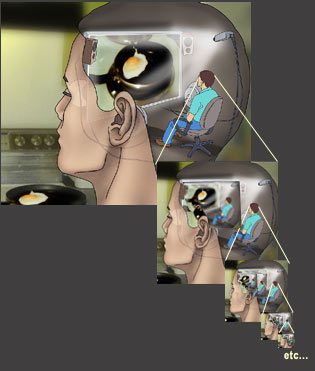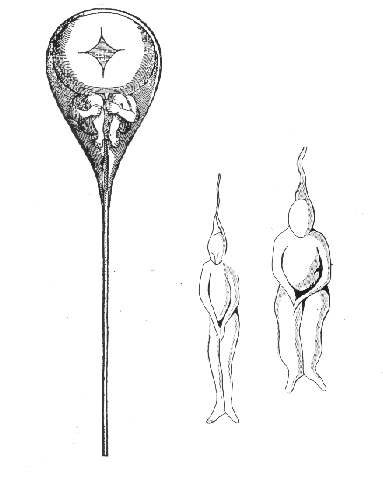Philosophy

When it comes to theories of mind, cognition and perception, there are a number of tools philosophers use in order to separate potentially workable theories from hypotheses that just don't have what it takes to even get off the ground. One of these requirements is that a good theory must avoid the homunculus problem (also known under some conditions, such as dualism, as the ghost in the machine). In essence, the problem here is a logical one, because it forces us to assume the very same phenomenon we're trying to explain, which is the essence of a circular argument.
 If you want to explain vision, for instance, and you argue that the lenses in your eye produce an image, which your brain, or a little homunculus inside your head 'sees' as if projected on a screen (which is why this problem is also known as the Cartesian theater), you haven't explained anything. All you've done is take the question one step back. Now you'd have to explain how the little homunculus 'sees' the image, and because of your original answer, you are committed to posit the existence of a smaller homunculus inside the head of the first homunculus... Lather, rinse, repeat all the way down the infinite regress you've just created and the mystery is not one step closer to being solved.
If you want to explain vision, for instance, and you argue that the lenses in your eye produce an image, which your brain, or a little homunculus inside your head 'sees' as if projected on a screen (which is why this problem is also known as the Cartesian theater), you haven't explained anything. All you've done is take the question one step back. Now you'd have to explain how the little homunculus 'sees' the image, and because of your original answer, you are committed to posit the existence of a smaller homunculus inside the head of the first homunculus... Lather, rinse, repeat all the way down the infinite regress you've just created and the mystery is not one step closer to being solved.
Unfortunately, apart from the creators of Terminator (whose futuristic robot had to read the information projected on a digital screen inside his own eyes, as you can see in the picture above), even such illustrious philosophers as Descartes, Locke, Spinoza and Bertrand Russell (among many others), have been guilty of committing this fallacy.
 Incidentally, Leibniz did not fall prey to the homunculus problem of mind, but he did fall victim to the spermatic homunculus problem because he thought that the presence of homunculi in human sperm was evidence of an eternal and infinite world of human preformation, and of the massive genocide that would occur every time a man ejaculates, even when he knocks someone up :) He didn't know it then, but the notion that sperm contained homunculi was based on the grainy quality of lenses of his time: as it turns out, there ain't such thing.
Incidentally, Leibniz did not fall prey to the homunculus problem of mind, but he did fall victim to the spermatic homunculus problem because he thought that the presence of homunculi in human sperm was evidence of an eternal and infinite world of human preformation, and of the massive genocide that would occur every time a man ejaculates, even when he knocks someone up :) He didn't know it then, but the notion that sperm contained homunculi was based on the grainy quality of lenses of his time: as it turns out, there ain't such thing.
Anyway, the following clip (from Woody Allen's Everything You Wanted to Know About Sex) nicely illustrates both homunculus problems in an amusing way you'll probably never forget :)
Or am I just reading too much into this? :)
Learn more about the mysteries of mind in the Brainspotting tag.
.
- Philosophy: Brain In A Vat Argument ? Truth Revealed
Brains in a vat? That sounds terrifying, doesn?t it? Brain in a vat argument is one of the newest thought experiments in philosophy of mind (discussed by John Pollock). Many people raise objection to the brain in a vat theory but are there in fact any...
- Property Dualism: Physicalism In Disguise?
Property dualism scheme Do you think it is possible to combine the physicalism (materialism) with the substance dualism? (If you don?t know the differences between these two check out the previous post.) For centuries people have tried to find common...
- Descartes, Dualism And Monism
Let?s assume that both you and me do have minds; I guess it would be way easier to think this post over if you had some free mind to use. Otherwise the idea of thought without a mind might get a little bit tricky ? but as you?re about to see, thought...
- Welcome!
Welcome to my blog! Since I've been interested in the philosphy of mind for some time already, I decided a few days ago that I should finally find a way to share my views on the subject - so here I am! I will try to write as much as I know and do...
- Anthony Quinton On Spinoza & Leibniz
Once Descartes set the agenda and got modern philosophy started, the greatest thinkers of Europe divided into roughly two camps: the empiricists, like Locke, Berkeley and Hume, who argued that substantive knowledge about the world comes exclusively from...
Philosophy
Sex and the Homunculus Problem of Mind

When it comes to theories of mind, cognition and perception, there are a number of tools philosophers use in order to separate potentially workable theories from hypotheses that just don't have what it takes to even get off the ground. One of these requirements is that a good theory must avoid the homunculus problem (also known under some conditions, such as dualism, as the ghost in the machine). In essence, the problem here is a logical one, because it forces us to assume the very same phenomenon we're trying to explain, which is the essence of a circular argument.
 If you want to explain vision, for instance, and you argue that the lenses in your eye produce an image, which your brain, or a little homunculus inside your head 'sees' as if projected on a screen (which is why this problem is also known as the Cartesian theater), you haven't explained anything. All you've done is take the question one step back. Now you'd have to explain how the little homunculus 'sees' the image, and because of your original answer, you are committed to posit the existence of a smaller homunculus inside the head of the first homunculus... Lather, rinse, repeat all the way down the infinite regress you've just created and the mystery is not one step closer to being solved.
If you want to explain vision, for instance, and you argue that the lenses in your eye produce an image, which your brain, or a little homunculus inside your head 'sees' as if projected on a screen (which is why this problem is also known as the Cartesian theater), you haven't explained anything. All you've done is take the question one step back. Now you'd have to explain how the little homunculus 'sees' the image, and because of your original answer, you are committed to posit the existence of a smaller homunculus inside the head of the first homunculus... Lather, rinse, repeat all the way down the infinite regress you've just created and the mystery is not one step closer to being solved.Unfortunately, apart from the creators of Terminator (whose futuristic robot had to read the information projected on a digital screen inside his own eyes, as you can see in the picture above), even such illustrious philosophers as Descartes, Locke, Spinoza and Bertrand Russell (among many others), have been guilty of committing this fallacy.
Anyway, the following clip (from Woody Allen's Everything You Wanted to Know About Sex) nicely illustrates both homunculus problems in an amusing way you'll probably never forget :)
Or am I just reading too much into this? :)
Learn more about the mysteries of mind in the Brainspotting tag.
.
- Philosophy: Brain In A Vat Argument ? Truth Revealed
Brains in a vat? That sounds terrifying, doesn?t it? Brain in a vat argument is one of the newest thought experiments in philosophy of mind (discussed by John Pollock). Many people raise objection to the brain in a vat theory but are there in fact any...
- Property Dualism: Physicalism In Disguise?
Property dualism scheme Do you think it is possible to combine the physicalism (materialism) with the substance dualism? (If you don?t know the differences between these two check out the previous post.) For centuries people have tried to find common...
- Descartes, Dualism And Monism
Let?s assume that both you and me do have minds; I guess it would be way easier to think this post over if you had some free mind to use. Otherwise the idea of thought without a mind might get a little bit tricky ? but as you?re about to see, thought...
- Welcome!
Welcome to my blog! Since I've been interested in the philosphy of mind for some time already, I decided a few days ago that I should finally find a way to share my views on the subject - so here I am! I will try to write as much as I know and do...
- Anthony Quinton On Spinoza & Leibniz
Once Descartes set the agenda and got modern philosophy started, the greatest thinkers of Europe divided into roughly two camps: the empiricists, like Locke, Berkeley and Hume, who argued that substantive knowledge about the world comes exclusively from...
